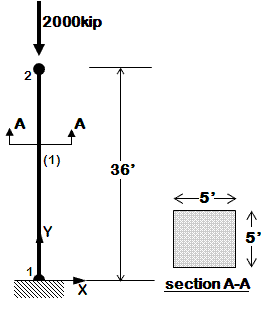OpenSees Example 1a. 2D Elastic Cantilever Column: Difference between revisions
Jump to navigation
Jump to search
(Created page with ' ---- Return to OpenSees Examples Manual Return to OpenSees User') |
No edit summary |
||
| Line 1: | Line 1: | ||
==Introduction== | |||
Example 1a is a simple model of an elastic cantilever column. The objective of this example is to give an overview of input format. | |||
While the structural model is the same, there are two lateral-load cases: | |||
{| style="margin:0; background:none;" | |||
<!-- Column 1 image --> | |||
|- | |||
| style="margin:0; style="width:25%; border:1px solid #red; background:#white; vertical-align:top;"| | |||
{| style="width:100%; vertical-align:top; background:#white;" | |||
! style="padding:2px" | | |||
|- | |||
| style="color:#000;" | <div> | |||
[[File:Example1a_Figure1.gif|link=OpenSees Example 1a. 2D Elastic Cantilever Column]] | |||
</div> | |||
|} | |||
<!-- Column 2 --> | |||
| style="margin:0; width:25%; border:1px solid #red; background:#white; vertical-align:top; " | | |||
{| style="width:100%; vertical-align:top;background:#white;" | |||
! style="padding:2px" | <strong>Objectives</strong> | |||
|- | |||
| style="color:#000;" | <div> | |||
*overview of basic OpenSees input structure | |||
*coordinates, boundary conditions, element connectivity, nodal masses, nodal loads, etc. | |||
*two-node, one element | |||
</div> | |||
|} | |||
Revision as of 04:48, 11 November 2009
Introduction
Example 1a is a simple model of an elastic cantilever column. The objective of this example is to give an overview of input format.
While the structural model is the same, there are two lateral-load cases:
|
|
Return to OpenSees Examples Manual Return to OpenSees User |
